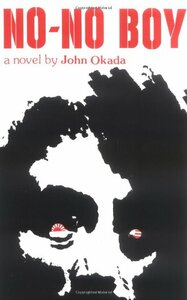Take a photo of a barcode or cover
challenging
emotional
informative
tense
slow-paced
Plot or Character Driven:
Character
Strong character development:
Yes
Loveable characters:
Complicated
Diverse cast of characters:
No
Flaws of characters a main focus:
Yes
I didn't appreciate this book when it was assigned reading in college. Reading it again, I see the beauty and truth in this writing. No one was writing like this as an Asian American back then, which makes this such an important book covering a taboo topic of that day. I thought I would try to sell it or donate it after I read it, but I find myself wanting to keep it now.
Some sentences that I liked:
"After Kenji had left him, the father walked down the hill to the neighborhood Safeway and bought a large roasting chicken. It was a fat bird with bulging drumsticks and, as he headed back to the house with both arms supporting the ingredients of an ample family feast, he thought of the lean years and the six small ones and the pinched, hungry faces that had been taught not to ask for more but could not be taught how not to look hungry when they were in fact quite hungry. And it was during those years that it seemed as if they would never have enough." pg. 123
"Love is not something you save and hoard. You're born with it and you spend it when you have to and there's always more because you're a woman and there's always suffering and pain and gentleness and sadness to make it grow." pg. 168
Some sentences that I liked:
"After Kenji had left him, the father walked down the hill to the neighborhood Safeway and bought a large roasting chicken. It was a fat bird with bulging drumsticks and, as he headed back to the house with both arms supporting the ingredients of an ample family feast, he thought of the lean years and the six small ones and the pinched, hungry faces that had been taught not to ask for more but could not be taught how not to look hungry when they were in fact quite hungry. And it was during those years that it seemed as if they would never have enough." pg. 123
"Love is not something you save and hoard. You're born with it and you spend it when you have to and there's always more because you're a woman and there's always suffering and pain and gentleness and sadness to make it grow." pg. 168
challenging
dark
tense
medium-paced
Plot or Character Driven:
Character
Strong character development:
Complicated
Loveable characters:
No
Diverse cast of characters:
Yes
Flaws of characters a main focus:
Yes
Absolutely would recommend to anyone. John Okada is a wonderful writer who is one of the first voices to bring the identity crisis and anger of the Japanese American population in the period following the Japanese-American internments in WWII. The main character is someone who answered "No" to the US loyalty test by refusing to go to war and refusing to renounce all ties to Japan. Coming back to the international district of Japan where friends and family are all dealing with different aspects of the aftermath of the disruption of their lives- Ichiro tries to find his identity, understand his anger and find hope for America.
adventurous
emotional
tense
medium-paced
Plot or Character Driven:
Character
Strong character development:
Complicated
Loveable characters:
Complicated
Diverse cast of characters:
Yes
Flaws of characters a main focus:
Yes
I’m somewhat embarrassed to admit that I have only just learned of this book and read it now. The story follows a Japanese American character named Ichiro, who declines to serve in the draft in World War 2 when his family is taken from their homes and are sent to “relocation camps.” Ichiro is subsequently imprisoned for declining to serve, and the story explores the consequences of this decision. I have so much to praise about this book. But what I’ll say for now, is that it is a must-read and it is truly a classic in American literature.
dark
emotional
reflective
sad
slow-paced
Plot or Character Driven:
Character
Strong character development:
Complicated
This is a remarkable work that I find a bit difficult to describe. Picture film noir set in rainy Seattle. There are three deaths, one by festering war wound, another a suicide, and finally a car accident, but none of these are the crimes the novel is concerned about. I call it noir because the deaths should be sad but they just made me tired though they were handled structurally as tragedy. In a way, the novel asks exactly what our crimes are. What crime has Ichiro's mother committed against her son? What crime does Ichiro convict himself of? What crimes am I guilty of? Ichiro is a detective investigating the source of our collective and individual alienations. The thing he finds is that if we are satisfied with our own inclusion when others are still excluded, we are guilty of crimes of inhumanity that ensure our ongoing alienation.
adventurous
challenging
dark
emotional
informative
sad
medium-paced
Plot or Character Driven:
Character
Strong character development:
Yes
Diverse cast of characters:
No





